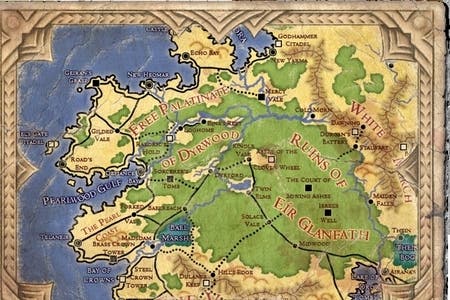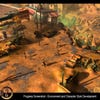Saturday Soapbox: Let the good times role
Is the resurgence of old-school RPGs down to more than simple nostalgia?
We humans are excellent at harking back to golden ages. The very phrase comes from the ancient Greeks, who believed that they were the bastardised remnants of human species of gold and silver. To call an era golden, then, is to imply that our time is poor in comparison. Because of this, most Golden Ages are hyperbolic fictions. Margaret Thatcher and her Victorian values, the Nazis and their pseudoarcheology, John W Campbell and the science-fiction of the 1940s, the crappy superhero comics of the 1950s...
For role-playing games, there was never such an age. If our spectacles were any more rosy, their thorns would prick out our eyes.
There was an age when role-playing games were made in much greater numbers than we've been used to - specialist historians refer to it in hushed tones as 'the early 1990s'. But it's the present that's the nearest we've had to a Golden Age - and the near future that will bring us back to reality, when a string of crowd-funded exercises in nostalgia like inXile's Wasteland 2 and Obsidian's Project Eternity arrives. Yes, I know I sound like a spoilsport or a prophet of doom or at worst a troll, but I'm just trying to provide a bit of balance to your neuralgia-inducing nostalgia. Bear with me.
Those games we loved: many of them were not perfectly designed, and many of their contemporaries were execrable. For every Ultima: The Black Gate on PC, there's an Ultima: The Black Gate on SNES. For every Wasteland, there's a Fountain of Dreams. Our memories are extremely selective. The piles of dross in our hinterlands have been carefully shunted behind Fallout and Baldur's Gate.
In our youth, we were also more forgiving of poor design. We may love clicking every brick in Legend of Grimrock now, but it's satisfying a learned pattern of old; one that, in itself, is boring. You'd consider hidden object games to be childish, but the original adventure games are little more than that - and most hardcore gamers have little patience with them now. The advances in role-playing games up to this day, up to Dragon Age, have been huge. I had tremendous nostalgia for Arcanum: Of Steamworks Obscura until I tried playing it again on GOG.com, died repeatedly and slowly, then realised quite how broken its interface and starting conditions were.
Also, this era ended - it went wrong. As Rowan Kaiser points out, 1995 was a watershed year for RPGs. Before then there was a hardware ceiling imposed by floppy disk size, but with new CD-only games like Myst and Dune, competition to use up that space was huge, and smaller RPG developers couldn't compete. Especially not as this new volume allowed the new flexible genres - first-person shooters, third-person action games, massively multiplayer games - to flourish. RPGs died back.
So, it's been a generation since RPGs were funded in a serious way by publishers - and during that era, publisher funding was the only option. The problem is that publishers have to justify every dollar they spend. Their responsibility isn't to their audience, but their shareholders. If they could spend that money somewhere else which would make their shareholders more money, they should. And RPGs (and strategy games) of this sort have a very discerning audience.
Ed Stern of Splash Damage pointed me at a New Yorker article about the marketing of movies, and in particular about how trailers lie so wonderfully about the movie that you're meant to see. The piece itself is fascinating, but what caught my eye was this line about marketing: "...once they reach thirty, these (older) women are the most 'review-sensitive': a chorus of critical praise for a movie aimed at older women can increase the opening weekend's gross by five million dollars. In other words, older women are discriminating, which is why so few films are made for them."
See that. Mainstream studios don't make movies for middle-age women; they're too discerning.
So here's my assertion: role-playing (and strategy) gamers are too discerning for publishers. The gamble just hasn't been worth it for the past 20 years. If you make a shooter, people will buy it and play it, even if it's utterly crap. You know, with a shooter, that it'll make you money. But in a world where the Mass Effect series can sell millions of copies and be regarded by some internally at EA as a commercial failure, that's not true at all of role-playing games. So why the resurgence now? There's a combination of factors - and the good news is that our misplaced Golden Age nostalgia is only one of them.
The resurgence of PC gaming under the careful curation of Steam has created a huge culture of low-price, low-tech gaming with exactly the audience necessary. And Kickstarter is a huge element, of course. Most of the games I can fund there are cheaper than they would be in the shops - as unlikely as it is that they'd appear on the shelves. So who's actually using it? Gamasutra surveyed 1,445 Kickstarter users: "The vast majority play games weekly (95 percent) on a Windows machine (87 percent), have played for over 16 years (82 percent), do not work in the game industry (65 percent), are men (91 percent) between the ages of 21-40 (85 percent), do not know someone who created a Kickstarter project (80 percent), but do know someone who supported a project (55 percent)."
What that shows is how many of us hardcore gamers are adults now. Nowadays we're happy to spend our disposable income on a Kickstarter game that we may never play because it fits with the sort of game we would want to play, the sort of game that we want to succeed. I may never have the time to play Bionite - but I was so desperate to see an up-to-date Battlezone clone that I supported it anyway.
And the developers are right there with us, rediscovering the idea of game development as a passion project. All those people who were trapped under the publishing system are out there, doing the game that they want to do. I don't know a developer who isn't making a game on the side, even the ones at indie studios. That moment of empowerment - when digital cameras let everyone be a photographer, or cheap paint let everyone be an artist, or blogs let everyone be a writer-publisher - came to developers, on Flash first, then mobile, then Steam. But Kickstarter is the first thing that's given them all an equal chance to display their wares.
And they're coming up with stuff to knock my wizard's hat clean off. They're of our generation, so they know the games we want to play because they want to play them too. They're not doing it cynically, with micropayments or fancy business models. They've all made family-friendly iOS titles until the smiles bleed off their faces. Now they want to make Grimrock, Xenonauts, Project Eternity and all the other RPGs that we all have nostalgia for.
Unlike the publishers, they're not thinking about the harshness of the audience. That's partly because this is the first time most of them have dealt with the audience, having been shielded from bad reactions and difficult decisions by publishers, and partly because they're members of that audience. They know what they need to do to make us happy.
So it's not just nostalgia driving the resurgence of RPGs; without the widespread access to the means of production, without the RPG-fan developers, without the easy funding, without the audience, these games would not be made today. Which is enough that, one day, people will look back and call this a Golden Age - but perhaps we should let the games come out before we say that, eh?



















-3-31-23-screenshot.png?width=291&height=164&fit=crop&quality=80&format=jpg&auto=webp)


